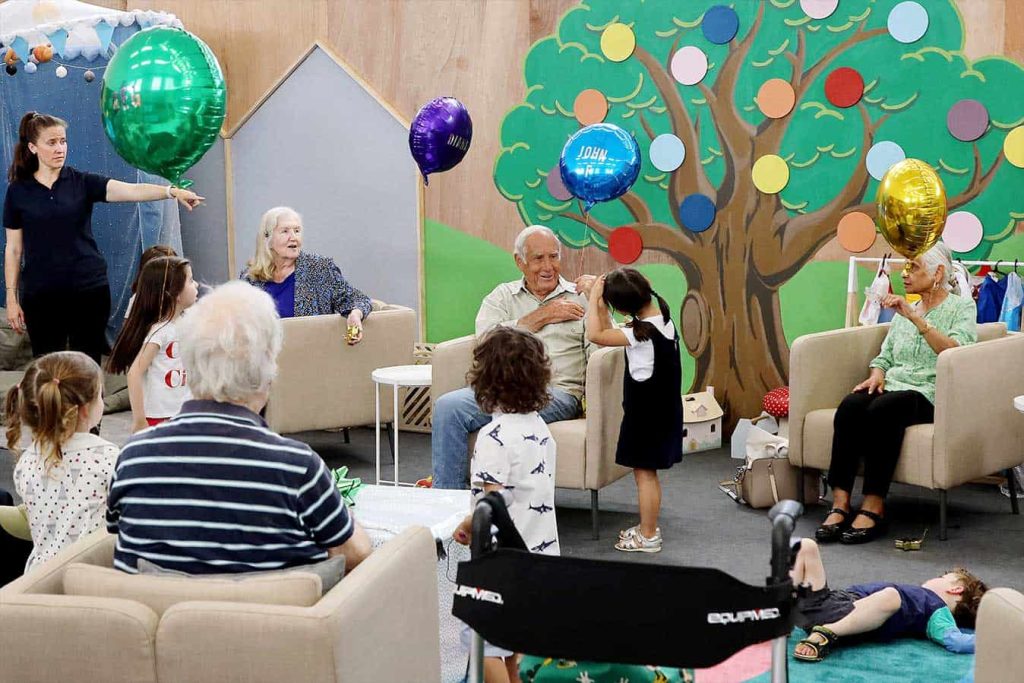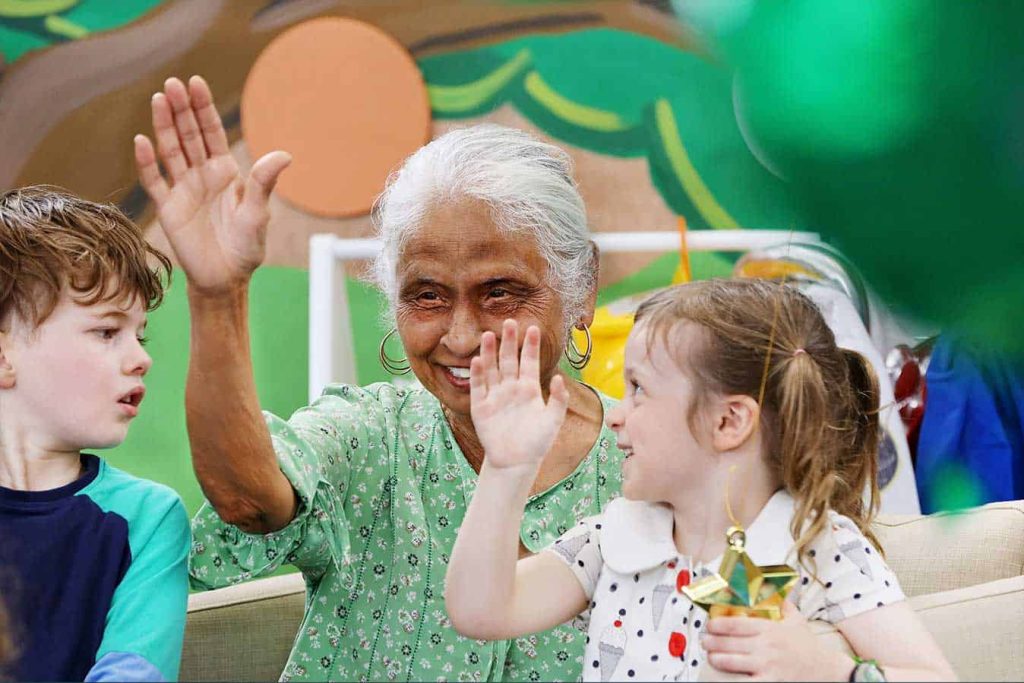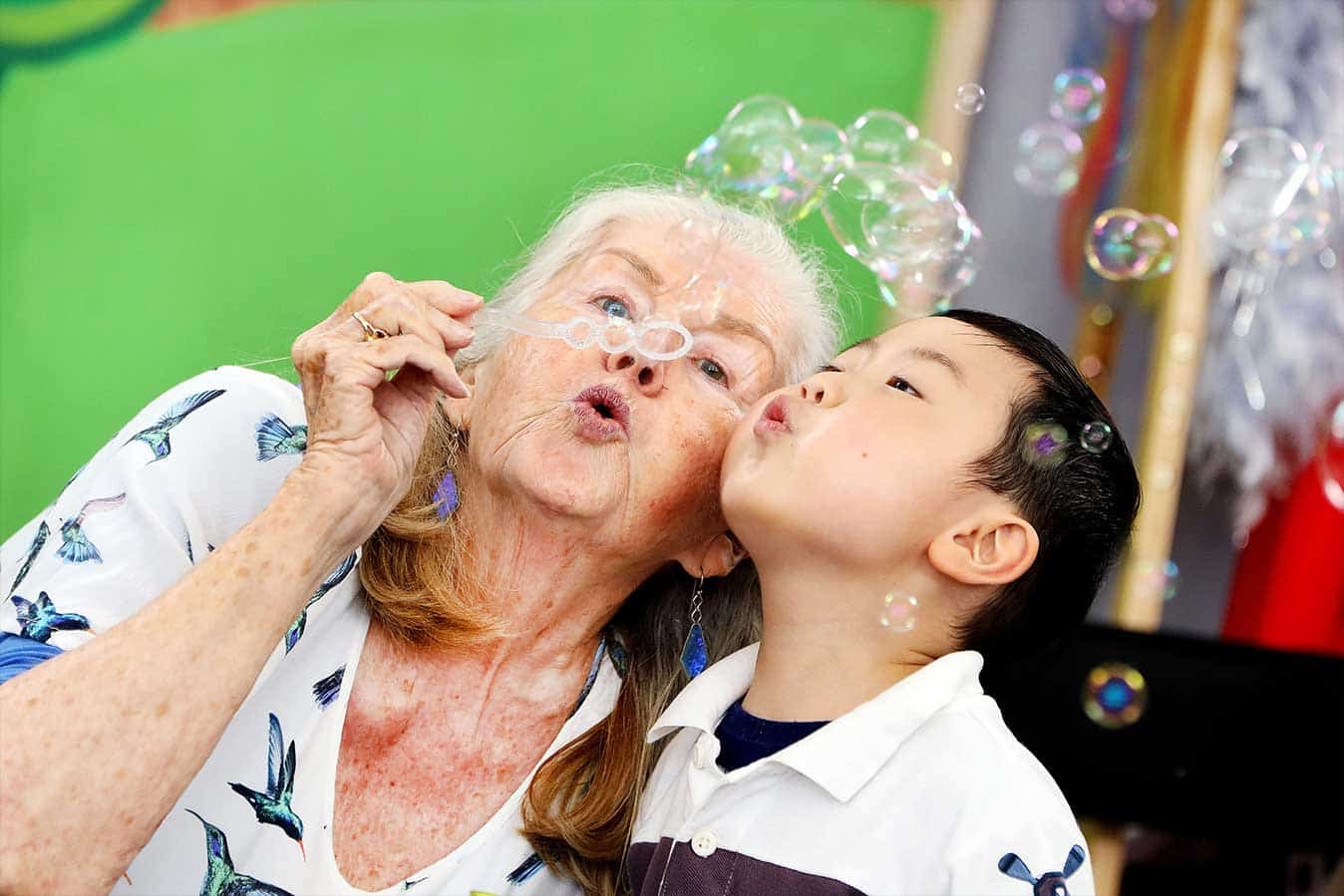Old People’s Home for 4 Year Olds, the heartwarming ABC documentary series that brought together a group of aged care and retirement home residents and preschoolers for daily activities to see if uniting young and old could improve the health and wellbeing of older people, is back for a second season.
In the opening season of the surprise TV hit, which went on to receive critical global acclaim, including the 2020 International Emmy Award for Non-Scripted Entertainment, Australians fell in love with 11 residents of a Sydney-based retirement village and 11 preschoolers brought together for an intergenerational social experiment.
Over seven weeks of planned activities including painting, gardening, group walks and social interaction, the documentary found that spending time with a group of four-year-olds did improve the health and happiness of the residents.
For season two, producers have flipped the experiment, this time focusing on senior Australians who live independently in their own homes and taking them out into the kids’ domain, a purpose-built pre-school, for fun, games, learning and friendship.

According to data, about 1.6 million Australians over the age of 65 live on their own at home, with many experiencing loneliness and isolation.
This prompted producers to investigate early intervention for the follow-up season and, specifically, if intergenerational contact could help reduce age decline and improve the health and happiness of older Australians, thus keeping them living in their own homes for longer.
Building the confidence of the elderly to find greater connections within their local communities was another strong focus.
Like season one, a team of experts in aged care health, geriatric health and wellbeing, child development and physiotherapy oversee the social experiment.
Older adults who feature in season two include 94-year-old Reg, a retired electrical engineer who grew up in London; 84-year-old John, who keeps busy as a driver for his local Meals on Wheels; 86-year-old Maureen, who describes herself as young in mind, and looking to feel young again; and Aesh, whose husband passed away nine years ago, who keeps active by walking a couple of hours a day and practising meditation.

The ABC documentary series’ Aged Health Care Expert, Professor Susan Kurrle, a geriatrician and professor at the University of Sydney, tells the ANMJ she has received over 1,000 emails from Australians across the country commenting on the show since the first season aired in August 2019.
They include ordinary Australians expressing their love for the show and enquiring about how they can help; pre-schools wanting to get involved; and aged care providers looking to replicate the program throughout their own facilities.
One email, from a retired teacher, shared how she and other retired teachers were so inspired by the show that they became volunteers and now visit several aged care facilities in Melbourne.
Positively, the indelible mark left by season one sparked new intergenerational playgroups around the country and even convinced some governments to pledge support for programs and intergenerational learning centres.
Asked about the biggest effect of the show, Professor Kurrle suggests the spotlight it shone on the loneliness often experienced by people living in residential aged care was far-reaching.
Research shows that between 40-50% of aged care residents do not get any visitors.
“It was the raising of awareness of what it’s like in residential care, the loneliness of people living in residential care and the way it is very different from living in the community,” she says.
“That was the biggest thing [impact]. Just people saying ‘I never realised it was like this, but isn’t it good you can do something, and how can we help?’”
“I’d like to think it [the series] raised awareness and made people realise that we have to do better [in aged care].”
So why a season two?
Professor Kurrle says season one proved that the experiment could work in residential aged care. Yet, 1.6 million Australians over the age of 65 live on their own at home, many who are potentially lonely and isolated and suffer health issues that contribute to physical decline.
Filmed during October and November last year in the Eastern suburbs of
Sydney, the second experiment brought together isolated older people living in their own homes and pre-schoolers.
Professor Kurrle says the effect on the older adults was magical, with their smiles returning along with a new spring in their step.
While children were the catalyst for the experiment, the development of relationships among older people emerged as an equally important benefit.
“The people, as you’ll see in the series, were alone, and you can really see the improvements,” Professor Kurrle says.
“It just hit me [through the series] how many people are socially isolated and it wasn’t just because of COVID-19. These were people who were living alone and lonely before COVID-19 hit. [What stood out the most] was the incredible benefits these people experienced when they were brought into a communal situation. And it wasn’t just linking with the children. Clearly, that was the reason for bringing them together, but what was also important was the linking with each other and I think that development of relationships was also really helpful.”
Professor Kurrle says the impact of season one has been enduring, with links forged between some aged care residents and children ongoing. For example, a number of the children had older people over around Christmas time last year
She puts the widespread appeal of the show down to its authenticity and point of difference from other TV offerings.
“I can’t explain why so many people loved watching it except that there was no sex, no violence and no bad language,” she jokes.
“It was beautifully produced and it was completely spontaneous. There was no script.
“I think it was the spontaneity and the genuineness of it when u compare it to some of the other offerings on TV like My Kitchen Rules or The Batchelor or Married At First Sight. And it appealed right across the aged spectrum.”
During the first season of Old People’s Home for 4 Year Olds, Professor Kurrle said she believed intergenerational care has the power to change aged care and improve quality of life and health outcomes.
Similarly, many hope the Royal Commission into Aged Care Quality and Safety, which handed down its final report in March, will result in meaningful change.
Professor Kurrle, who worked for the Royal Commission as a Medical Advisor, believes the Commission’s recommendations, particularly establishing a new Aged Care Act, go a long way towards improving the system.
“I hadn’t realised until I started doing the consultancy work with them that the current Aged Care Act, more than two-thirds of it is about pricing and funding, not about care. There’s nothing about care. So the whole idea of a new Aged Care Act which really does focus on the care that’s provided I think is very important.”
The recommendations regarding staffing, specifically the minimum amount of care provided, including by registered nurses, are also incredibly important, Professor Kurrle adds.
She suggest it will take a lot of community action and lobbying politicians to fix aged care.
“That’s a really good start because it’s bringing the registered nurse back into the picture again,” she says.
“We have to do a lot of work, we being the community, to make sure the Government actually does something about it.”
Season 2 of Old People’s Home for 4 Year Olds screens from Tuesday, 6 April at 8.30pm on ABC TV and ABC iview









12 Responses
Yesterday my lovely son took me out for the day. Down the river by ferry and through the city of Brisbane across the river to the Art Gallery and Southbank. He had bought a wheelchair the day before on gumtree. It was a wonderful day accompanied by my granddaughter and apparently inspired by him viewing part of the programme on old people and 4 year olds of which I am a fan but hadn’t realised he had seen it also. So thankyou ABC for this great show. It would be so wonderful if this experiment could expand all over our country. So many of us oldies would just love it. Again thank you.
This has to be the best program on tv it was so
Special I absolutely ❤it. A bit sad that it has ended
It just shows what little ones can do to the older people. I’m glad that they have kept in touch .
Crongratulation I even shared A tear at the end
So many grandparents are forgotten nowday which is very sad .kids need them and the older people need them .I give it a 10 out 10 ????????????????
I have just finished watching the second season of this program and it is absolutely amazing to witness the positive changes in physical health and psychosocial wellbeing as a result of this intergenerational intervention. It is a credit to all who took part, and those involved in the planning, development, production and evaluation of this program. I believe it provides an important contribution to the evidence base surrounding the impact of intergenerational programs on both children and elderly alike and supports the wide-scale implementation of such programs across Australia. I cannot wait to see the next season!
I have loved this program, i loved every moment of it, I really want to adopt George, would love to know more about this lovely man, his history, his whole life, I would really like to know how to contact him, I hope that he’s ok, throughout this awful pandemic, I hope all these lovely people are, I’m hoping that someone can help here. I lost my broyher, sister and my dearest dad in 2020 , all within 3 weeks, George reminded me so much of my dear dad, so much
Absolutely splendid! I am even doing a write up on it for an exam!
My wife hadn’t seen her mum for 4 years he brother sold her home and hid her in a age-care home , we found her thru the salvation army , we went to see her she was medically restrained with drugs , I found a wheelchair and we took her for a walk she smiled ,,, we visited her a few times and then she passed away ,, Im happy we found her before her passing , we were not informed about her passing and my wife didn’t get to go to the funeral A very sad day for my wife I don’t think she will ever get over it ,, But thats family for you ,,
Absolutely brilliant programme. Goes to show how connection & the sharing of special moments can be so transformative for EVERYone involved. Well done to all concerned & please keep the series going.
Watching this program third time, and still discover new and heartwarming details.
How much I would love to take part in something like this and reduce the alienation of the society. Thanks for the program!!!
Please please make more programs like this. It’s so good for the elderly and so good for the children..
This experiment is so incredibly powerful and quite obviously a success. Congratulations to whoever developed the concept everyone who brought it to life. I had immense pleasure in watching the program, I’ve laughed and cried. I was so excited when I heard there was a season 2 and I really hope there’s more to come.
I’d love to know how the community can get behind this to integrate it within the broader community …I’m not sure waiting on the government to prioritise is the answer. If it is the only way then how do we help lobby for it?
My 3 year old and I are currently watching season 1 and keeps asking if she can be part of this. She turns 4 in Feb 2023 any chance of a season 3? We are from western Sydney and keen to travel for filming.
My grandma is 90 and they have an amazing relationship. It’s amazing for children and adults to be part of each other’s world’s and not all of us get to experience that.
Inspiring to see the way relationships and personal development progressed during the programme, especially season 2.